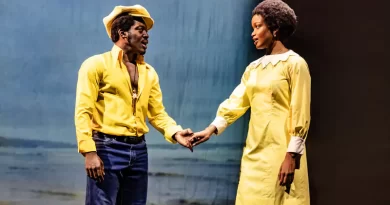“After the Act” at Royal Court Theatre Downstairs
Mark Shenton in West London
27 May 2025
For those of us who lived through it, the very public naming and shaming of gay relationships as explicitly lesser than straight ones that culminated in the passage of Section 28 of the Local Government Act in 1988 was a vile and violent attempt to turn back the clock on our increased visibility and force us back into the closet. As Billy Barrett, director and co-author (with original and still remaining cast member Ellice Stevens) of After the Act remarks in a programme note, many queer people have argued that its spirit was “being resuscitated in a new form via the vicious backlash against trans rights”.
The original 1988 provision forbade the intentional promotion of homosexuality or the publishing of material that would do so, or any positive messaging in teaching about “the acceptability of homosexuality as a pretended family relationship”. It was introduced into law by the then-Conservative government of Margaret Thatcher, and stood on the statute books for some 15 years before being repealed in 2003; the Conservative Party of David Cameron would the following decade undo this wrong further by being the party to preside over the legalisation of same-sex marriage in 2013. So progress has been made, but the culture wars being pursued by Donald Trump in the US and Kemi Badenoch over here remind us that it is still a fertile battle ground.
After the Act is a documentary-style reminder of how Section 28 came to be enacted. But it also covers the pushback of public protest that occurred at the time that thrillingly included lesbian protestor invasions of both the live six o’clock national BBC television news and an abseil from the public gallery of the House of Lords into the chamber as the law was being debated. It’s a valuable and timely project of using theatre to reclaim a chapter of recent gay history that has been too little documented so far.
This theatrical edit is necessarily a bit scrappy and not always subtle, but it has a raw and likeable energy throughout, partially facilitated by the decision to turn it into a musical, with composer (and onstage musical director) Frew, joined by a percussionist, providing a lively period pastiche electronic score, at times reminiscent of the Pet Shop Boys. You won’t go home humming the melodies, or urgently seeking out the cast album. But you’ll be entertained, and hopefully provoked and angered, by some of the stories it tells.
Breach Theatre’s production is performed with warmth, wit, and zeal by original cast members Zachary Willis and co-author Ellice Stevens newly joined by Ericka Posadas and Nkara Stephenson.
Born at London’s New Diorama in 2023 on the 20th anniversary of the law’s repeal, when David Byrne ran that developmental powerhouse, it is now revived at the Royal Court that Byrne has since taken over. It stands as a bold piece of cross-over programming between his two theatrical lives, bridging an exciting new chapter in London’s theatrical ecology.









